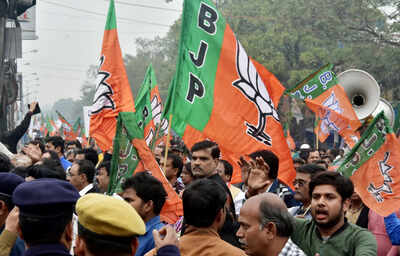
NEW DELHI: The BJP suffered yet another defeat in state assembly elections on Tuesday in Delhi.
The party's blitzkrieg in state elections which began after winning the 2014 Lok Sabha polls seems to have lost its momentum in the last two years.
In 2018, the BJP failed to form a government in three states - Madhya Pradesh, Rajasthan and Chhattisgarh. Even after scoring a decisive victory in the Lok Sabha polls in 2019, luck hasn't been on BJP's side when it comes to assembly polls. It lost Maharashtra, despite emerging as the single-largest party. In Jharkhand, it failed to forge a pre-poll alliance with other regional parties.
BJP's recent dismal performance at the state level can be attributed to five main factors - dependence on PM Narendra Modi, Amit Shah's shift to the home ministry, the inability of BJP to forge alliances at the state level, polarization and a faltering economy.
Too much dependence on PM Modi
Narendra Modi's charisma has been a blessing for the BJP at the national level. However, it appears that the same charisma has failed to cast its spell at the state level where local issues hold greater sway. For instance, the BJP won all the seven Lok Sabha seats in Delhi with a vote share of 56.9%. However, the party is likely to only seven out of seventy assembly seats with a vote share of around 38.7%. Thus there is a huge fall of 18.2% for BJP vis-a-vis lok Sabha and assembly polls. The party's overwhelming reliance on Modi and its inability to give credence to local leaders has worked against it.
Home minister Amit Shah
Following the emphatic victory in the 2019 Lok Sabha polls, Amit Shah was given the charge of the home ministry. Shah had single-handedly managed party's affairs ever since the historic 2014 elections. The last several assembly election results show that Shah's absence at the helm of the party's affairs has had an impact on its performance. Ever since Shah took the role of Union home minister, the BJP has lost three of the four assembly polls — Jharkhand, Delhi and Maharashtra where it emerged as the single-largest party but failed to form a government owing to its feud with Shiv Sena.
A crucial factor in BJP's defeats has been its inability to forge alliances. In Maharashtra, despite being the single-largest party, it could not form a government. The saffron party's feud with its age-old political ally, Shiv Sena, proved detrimental for it.
Even in Jharkhand, BJP did not enter into a pre-poll alliance with the regional parties, thus leaving the space open for the opposition to consolidate the votes. It was ruling in alliance with one political party, AJSU (All Jharkhand Student Union), however, it broke even that alliance before the polls.
Politics of polarisation: Is it working?
The tactic of polarisation — the "Hindu-Muslim issue", the repeated mention of Pakistan in election rallies, the vociferous campaign against the anti-citizenship law protests, seems to have had little impact on BJP's performance, if at all. In Delhi, which saw one of the most communally polarised campaigns in recent history, BJP increased its vote share by 7% but could manage to add only four more seats to its 2015 tally. However, BJP's gain has come mostly at the expense of a decline in vote share of Congress and other regional parties. So it is difficult to ascertain if the tactic of polarisation is working for the saffron party or not.
A faltering economy
The NDA government has been unable to arrest the faltering economy for quite some time now. The opposition, especially the Congress, has used financial slowdown as one of the major poll issues. While BJP which used to always talk about India being the fastest growing economy in the world has been shying away from making economy its poll isue.
The party's blitzkrieg in state elections which began after winning the 2014 Lok Sabha polls seems to have lost its momentum in the last two years.
In 2018, the BJP failed to form a government in three states - Madhya Pradesh, Rajasthan and Chhattisgarh. Even after scoring a decisive victory in the Lok Sabha polls in 2019, luck hasn't been on BJP's side when it comes to assembly polls. It lost Maharashtra, despite emerging as the single-largest party. In Jharkhand, it failed to forge a pre-poll alliance with other regional parties.
BJP's recent dismal performance at the state level can be attributed to five main factors - dependence on PM Narendra Modi, Amit Shah's shift to the home ministry, the inability of BJP to forge alliances at the state level, polarization and a faltering economy.
live fromDelhi Assembly Elections
morelive updatesNarendra Modi's charisma has been a blessing for the BJP at the national level. However, it appears that the same charisma has failed to cast its spell at the state level where local issues hold greater sway. For instance, the BJP won all the seven Lok Sabha seats in Delhi with a vote share of 56.9%. However, the party is likely to only seven out of seventy assembly seats with a vote share of around 38.7%. Thus there is a huge fall of 18.2% for BJP vis-a-vis lok Sabha and assembly polls. The party's overwhelming reliance on Modi and its inability to give credence to local leaders has worked against it.
Home minister Amit Shah
Following the emphatic victory in the 2019 Lok Sabha polls, Amit Shah was given the charge of the home ministry. Shah had single-handedly managed party's affairs ever since the historic 2014 elections. The last several assembly election results show that Shah's absence at the helm of the party's affairs has had an impact on its performance. Ever since Shah took the role of Union home minister, the BJP has lost three of the four assembly polls — Jharkhand, Delhi and Maharashtra where it emerged as the single-largest party but failed to form a government owing to its feud with Shiv Sena.
A crucial factor in BJP's defeats has been its inability to forge alliances. In Maharashtra, despite being the single-largest party, it could not form a government. The saffron party's feud with its age-old political ally, Shiv Sena, proved detrimental for it.
Even in Jharkhand, BJP did not enter into a pre-poll alliance with the regional parties, thus leaving the space open for the opposition to consolidate the votes. It was ruling in alliance with one political party, AJSU (All Jharkhand Student Union), however, it broke even that alliance before the polls.
Politics of polarisation: Is it working?
The tactic of polarisation — the "Hindu-Muslim issue", the repeated mention of Pakistan in election rallies, the vociferous campaign against the anti-citizenship law protests, seems to have had little impact on BJP's performance, if at all. In Delhi, which saw one of the most communally polarised campaigns in recent history, BJP increased its vote share by 7% but could manage to add only four more seats to its 2015 tally. However, BJP's gain has come mostly at the expense of a decline in vote share of Congress and other regional parties. So it is difficult to ascertain if the tactic of polarisation is working for the saffron party or not.
A faltering economy
The NDA government has been unable to arrest the faltering economy for quite some time now. The opposition, especially the Congress, has used financial slowdown as one of the major poll issues. While BJP which used to always talk about India being the fastest growing economy in the world has been shying away from making economy its poll isue.
Download The Times of India News App for Latest India News.
more from times of india news
Get the app









